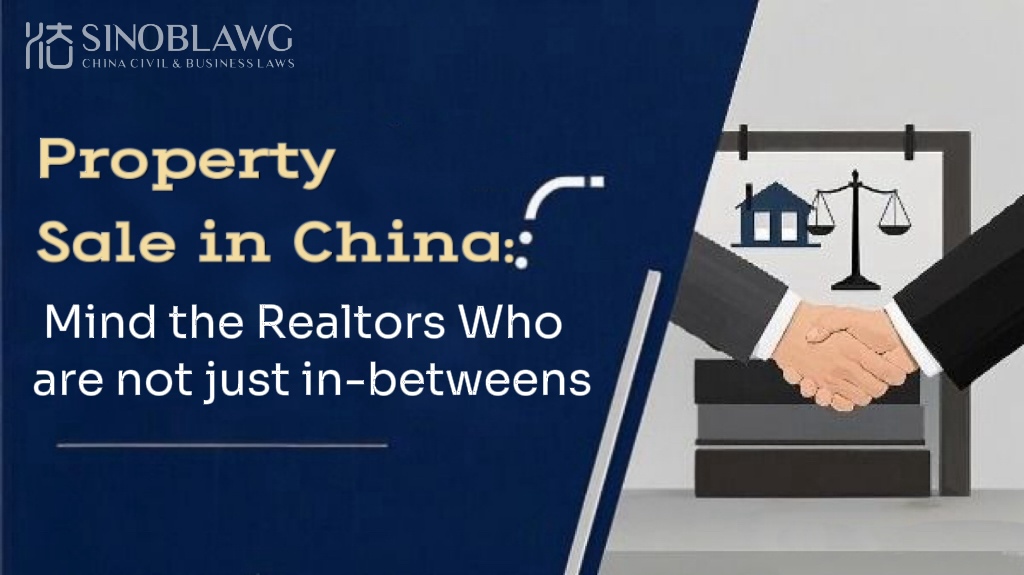Very often, we help foreign clients to sell their China properties after they inherit estate properties in China. Indeed, this has been a big part of my team’s legal practice for over a decade. We don’t just sell properties in Shanghai, but also in Beijing, Shenzhen, Guangzhou, and occasionally in Chengdu, Kunming, Suzhou and other cities as well.

While most clients trust us and follow our advice in getting the sale done, sometimes, foreign clients may have difficulties in understanding the way property transactions are conducted in China. For example, recently, a client from USA kept saying it is too risky to effect title transfer before receiving full contract price for the property in question, and we really had a hard time to convince her to believe this is the standard way of transacting a real property deal in China.
So it is worth a post to delineate and outline the steps and procedures of selling a property in China. While each city may have some special rules, at large, the steps and procedures are much the same for most cities in China.
1. Listing Property in the Market
Unlike the North America, China doesn’t have a national MLS to promote sale of properties, and instead, sellers always list the properties with realtors firms in the neighborhood. Those realtors will promote the properties on their office windows, online web portals. This is the effective way of promotion because buyers in China generally visit the neighborhood for property listing information where they wish to buy their properties.
Realtors firms tend to ask for exclusive listing with their firm. By “exclusive”, it means that other realty firms cannot promote the properties directly for the owners/sellers, and instead, other firms shall have to work with the exclusive realty firm to sell the properties. The advantage of this exclusivity arrangement is that the owner doesn’t have to deal with many realtors that can be a big headache by picking up too many phone calls before picking up the final buyer. On the other hand, the disadvantage is obvious: sellers may not be able to find the best offer through the exclusive agent who may intentionally suppress the price in order to make a quick deal.
In practice, once clients hire our services, we always list the property with multiple realtor firms in the neighborhood, and sometime within hours, many calls start coming in.
2. Entering into Letter of Intent or Three-Party Preliminary Agreement
Out of hundreds of calls from different agents, you will always be lucky to have some interested buyers showing up. Realtors generally ask the interested buyer to put down a small amount of earnest money (saying RMB 10,000 – 50,000 depending on the total price of the deal) with the realtor firm, and the realtor will present the offer to the seller.
If major terms (sometimes such terms could be as detailed as those in final contract) are agreed, a preliminary agreement is usually signed among the seller, buyer and the realtor firm.
The primary reason for signing such an agreement is to secure the deal by way of a legal written document before the formal contract is signed. Sometimes, the buyer may need a bit time to get ready the amount of down payment and such agreement affords such time cushion. Since such agreement contains all major terms for the sale of the property, courts will enforce the agreement if one party commits breaches thereunder, despite that such agreement is not acceptable to local real estate registration authority for purpose of transferring title of the property to the buyer.
Please be advised that such a preliminary agreement may not be necessary if the buyer and seller can immediately agree on all the terms and the buyer is financially ready to commence the transaction.
3. Concluding the Official Sale and Purchase Contract and Supplementary Agreement
After the conclusion of the preliminary agreement, it generally takes a few days or a couple of weeks before the parties sign the official and formal sale and purchase contract to finalize their deal.
In almost every municipal city in China, local real estate authority has their official version of sale and purchase contract that must be adopted for purpose of effecting title transfer to the new buyer. The reason is simple: to save time for real estate registration authority to process each deal by standardizing deal terms and streamlining the deal process.
But in reality, very often, there are always peculiar situations that are not adequately addressed in those official contracts, and thus there is always a side supplement agreement to be signed at the same time of signing the formal contract. In such supplement agreement, you will often see clauses like the following:
(1) Lowering the price in the official contract. As a way to help both parties to reduce tax burden, the parties often agree to lower the price in the official contract which is the price for the governments to assessing the taxes on both parties. Of course, the parties cannot go too far to insert an ridiculously low price in the official contract, since local tax authority always has their own benchmark prices for each properties in their jurisdiction.
As a foreigner owner selling properties in China, we generally don’t advise clients to do that because that will affect the amount of money the foreigner owners can repatriate out of China.
(2) payment of taxes. Very often, to save the trouble of foreigner owners to send money back to China to pay their part of the taxes, it can be arranged that the buyer will pay the taxes that are supposed to be paid by the sellers, and deduct the same amount of money from the sale price.
(3) settlement of contract price offshore. Strictly speaking, it is illegal to settle China transaction in foreign exchanges outside China. However, occasionally the foreigner sellers may need foreign exchange money to pay off their mortgage loan denominated in USD for their China properties, and when buyers have some foreign exchange fund out of China, it is always sensible for the buyers to help the sellers to clear the mortgage on their properties first as required by the law (With China Civil Code to come into effect the day after tomorrow, such practice may change).
(4) though in most cases, sellers will only hand over properties to the buyers after receiving the full value for the properties, but sometimes buyers may require earlier handover for purpose of early renovation. The parties may wish to set out special clauses for such special arrangements.
There could be other reasons for such supplement agreements.
4. Escrow Arrangement
While escrow arrangement in property transactions is customary practice in western countries, it is nonetheless not always used in China. For example, in Shanghai, people don’t really use escrow account at all. Earnest money and down payment are always paid into the seller’s account directly.
In some other cities in China, they have compulsory requirement to utilize escrow arrangement to ensure the safety of the transactions.
5. Buyers Applying for Bank Loan
Though buyers should have talked with their banks about availability of bank mortgage loan, the paperwork shall only start after the execution of the official contract. Only when the buyer’s loan is approved by the bank will the parties apply for title transfer at real estate registration center.
When a buyer needs mortgage loan financing from the bank, it is critical that the loan will be approved and honored by the banks. In practice, seldom does any bank default on their approved loans. So once the loan is approved by the bank, the seller should feel secure to proceed to transfer the title to the buyer.
As a practice in real estate transactions, typical contracts always requires that the buyer shall make up in cash for any shortfall of bank approved loan, and such cash shall be paid before or upon the day of title transfer.
6. Seller Clearing Mortgage Loan on the Properties
As mentioned above, if the seller still has unpaid mortgage loan on their properties, it is required that such mortgage loan shall be paid off before the seller can sell the property. Therefore, after the signing of the official property sale and purchase contract, sellers shall apply to prepay their outstanding mortgage loan.
While China Civil Code now allows properties to be transferred with mortgage on, it remains to be seen how banks will react to such new rules. However, as a matter of contract law, the seller’s transfer of title doesn’t transfer the mortgage obligation automatically to the buyer. Thus, banks may only require the sellers to prepay the outstanding mortgage loan before the title transfer becomes possible.
7. Title Transfer
Once the down payment is made upon signing the official contract, and buyer’s application for mortgage loan approved, and seller’s existing mortgage deregistered, then it is time when the parties apply to local real estate registration center to effect title transfer to the buyer.
Here is often a point leading to worry and concern to foreign owners of China properties. They cannot believe that before receiving the full price of their properties they are now transferring title to the buyer. Well, it does make sense to many foreigners who are familiar with their home countries practice, but things are just different across borders.
8. Payment of Taxes and Issuance of New Title Deed
Taxes are unavoidable in property transactions, though there may be exemptions available to either sellers or buyers.
Taxes shall have to be paid and cleared before the new title deed is issued to the buyer. In practice, in about a week time after submission of documents for title transfer to real estate authority, the parties shall go to tax authority to pay their respective taxes.
Taxes can be complicated in most countries. China is no exception. When it comes to taxes on property transactions.
(1) Residential properties differ a lot in taxation from commercial properties. The latter carries a lot more and heavier taxes.
(2) Residential properties are divided into two categories: ordinary properties and non-ordinary properties, which shall be decided considering local applicable standards. Heavier taxes attach to non-ordinary residential properties.
(3) Generally, a seller of residential property is imposed with two taxes: VAT tax and personal income tax. VAT is based on the difference between sale price and original purchase price, and personal income tax is either levied on the same difference or on the total value with a lesser rate. A buyer of residential property ought to pay the deed tax, which varies from 1.5% to 3% depending on size and category (ordinary or non-ordinary) of the said property.
As mentioned above, in practice, sellers often ask the buyers to pay VAT and income taxes shifting such costs to the buyers. However, at the end of day, such costs are all reflected in the negotiation of the final prices. Foreigners may be confused on this but again the Chinese people have their own way of doing things.
Once taxes are paid, the real estate authority will issue the title deeds to the buyers on the same day of tax payments.
9. Release of Bank Loans to Sellers
Till now, the deal is not done yet as the seller has not received the full price in case that the buyer relies on a mortgage loan to finance his or her purchase.
Banks shall only release the loan proceeds after the property is mortgaged (hypothecated) to the bank. If the bank defaults, then it is the liability of the buyer to the seller.
Now, the tricky part is about release of the mortgage loan proceeds obtained by a buyer in such a property deal. The mortgage loan is applied for by the buyer and normally it is supposed to be paid to the buyer. In practice, the loan money doesn’t stay long with the buyer borrower but is swiftly paid to the seller after hitting the account of the buyer. In other words, the buyer borrower doesn’t have any chance to manage the fund in his or her account before the money leaves for the seller. It is in this sense that the sellers can be assured that they will receive the mortgage loan proceeds in due course.
10. Handover of the Property to Buyer
Finally, it is time to hand over the property from seller to buyer once the full price is paid to the seller.
In some cases of property transactions, such as sale of garden villa properties in Shanghai, a more complicated issue of paying land grant fee to local government can be involved, a process seldom handled by most realtors. Since it is only exceptional, we won’t write much about it here.







How long does it normally takes for the transaction process? 1 month or three months period ?
1. Buying a new property from Developer.
2. Selling a resale property in China ?
Kindly advise. Thanks
Purchasing China properties from a developer may take only a few weeks if the property is finished and ready to sell, not a presale property.
Selling a property in China can take days, weeks to months depending on asking price.
hello Jason
I’ve a property in chong san like to sell, do you dealing chong san property? what is the cost and percentage charge for handling fees ? please confirm
Hi we deal with property throughout the whole country. The fee is of course related to scope of services. Generally, we help clients sell properties, open bank accounts(if you don’t have one), repatriate sale proceeds out of China. We also consider the value of the property and complexity of ownership structure, and chemistry among co-owners. In regard of money reparations, we also need to know whether you bought the property initially with a foreign passport or using Chinese identity. I will send you an email to follow up.
Helo, my apartement in shanghai , sertificate in my hand. But from bank they said we have loan but actualy since 2014 we pay all my loan. How could bank said still have loan and sertificate in my hand
Hi Petrus, I don’t quite understand the situation. You thought you have paid up all loan and the bank is saying you have not? It is ok for you to hold the certificate while you still have a bank loan on your property.
I am based in the U.K. and am looking to sell a property that I own in China. Do I need to be in China to finalise the sale or can all the paperwork be signed while I’m in the U.K.? I don’t have a Chinese bank account – do I need to go to China to open an account for the sale proceeds?
Hi Lousia, no you don’t need to come over to China if you don’t want to, and you don’t need to come over to open a new account, as we will be able to open the account for you. I have been providing this services for more than a decade, old enough to be a mature service provider in this area. 🙂 For further disucssion of the matter, please send messages to my email account on the blog.
Hello Jason,
I would like my family to sale my property because I can’t stay too long. Can I get POA done when visiting China. Is there standard format of POA or we need to draft our own? How can I receive the money from buyer as I don’t have bank account in China? Thank you very much.
Jenny
Hi Jenny, the POA has to be tailored to client’s own circustances. We have been helping foreign clients selling their China property and repatriate sale proceeds out of China for more than a decade. Would be more than happy to help you with this as well. You don’t have to come to China to attend to the sale, as we will be able to help you throughout the whole process. In the meantime, we can even help to open a China bank account for you without you coming to China. Just let me know where your property is. Once we learns of the rough value of the property, we will give you a legal quote on our services. Cheers!
Hi Jason, I have a residential property in China. I only have the sales contract with the developer and never got the Deed and Title. Now I want to sell it after almost 10 years. What would be the steps?
in which city of China? Why have you NOT been able to obtain the title deed? Any inherent legal problems like the property is sitting on rural land? It could be possible to sell it without a deed in some very limited circumstances. But as a matter of law and practice, you Will still need to get title before you can sell. Let me know more details through emails.
Good afternoon
Where can I find more information with regards to the transfer of semi legal / informal / farmer housing?
Regards
I don’t know any credible source of such information. Indeed, not sure there is such information on rural land or farmer housing on the internet at all. If you have any specific matter, please tell us more. We are happy to help you on this.
Hi Jason. Thank you so much for your post. It shed so much light on the expectations of the buyer and seller, and the process. Especially with the title transfer before receiving the full price. I have a question related to the title transfer. As part of the process, is it ok to give the seller’s “red book” which evidence the current ownership to the buyer’s real estate agency to process the title transfer? Thank you.
hi Emma that is the normal practice here in China, to avoid seller selling the same property to a second buyer. Buy as a foreigner selling properties in China, there are a lot more other issues to be wary of, esp foreign exchange control laws should be taken into account upon entering into sale and purchase contract. Good luck!
Do the owners need to be present at the sale? My wife (sole title holder and Chinese) and I (non chinese) live over seas. We are wondering if one or both of us need to be present for the sale.
No need for her to come back so long as she gives a power of attorney to us or someone she trusts. That attorney can help with sale throughout the whole process. However if you are also concerned with money repatriation,then it depends.
hi. We have an apartment at Panyu Guangzhou. we listed with a real estate agent and signed contract selling the apartment at a title company with the seller. Seller only gave 40% of the deposit on day we signed the contract with promise to wire the rest the next day but we never got the rest of deposit. seller then say will pay rest of the deposit on final contract time which is suppose to be in 10 days. what is our option if seller rescind on the purchase?
Your option depends on your contract terms. Generally contract contains breach of contract liabilities.I cannot advise much based on such scarse information. Legally, if the buyer fails to perform his or her part of obligations, resulting in your loss, you have the right to claim such loss against him or her. Hope things will work out, and if not, then contact me via my emails.
Hi Jason,
I am planning to sell a property in Shanghai (a small apartment). Would like to have additional information about your legal services and your contact information.
Thank you!
ok, will reply in more details in email.
Hello Jason i have an inherited property in shenzhen i would like to see if i could sell it do you deal with this sort of transactions and the your fees a % of the selling price
hi Steven, I would send you a separate email regarding your inquiry. As you have noticed, we have been practicing this area of law and services for more than a decade, cumulating tons of experience that can be make sure things are done smoothly. Cheers!
Hi, great article! Any idea on how to repatriate proceeds from sales out of China?
Henry, we have been doing this for clients for more than a decade. Depending on how you manage to acquire China properties, the route for taking the money out of China is different. To know more details, please send us emails elaborating on your own case.
My parents owned a house in China and gave my brother the power of attorney to sell it. They passed away. Is that power of attorney still valid in China? It is a durable power of attorney.
Also, someone told us that he needs to go back in person and sold the real estate agent the title in order for them to list it? Is that true? That does not sound reasonable?
I think in this case, your brother shall stop the sale and sit down with you and other heirs and discuss inheritance. Unless the POA is well drafted, it is not likely that your brother can still manage to sell the property without getting inheritance done first, though theoretically with a good POA, he may be able to do that. On the other hand, you shall intervene the sale by alleging that your brother shall no longer be legal to sell the property and inheritance shall be carried out first.
Hi Jason,
I own a house in Hang Zhou and I am looking at giving power of attorney to someone to help me sell it.
Would you be able to tell me the steps needed to get this power of attorney? Is it a particular/special power of attorney?
Many thanks!
hi Emily, yes, this POA shall be carefully written and include necessary powers to ensure smooth process of sale. If you are a foreigner, then you shall need to make sure you have a bank account in China, and if you wish to repatriate the sale proceeds out of China, then POA shall be designed accordingly to cover these work.
Hi Jason,
I own a house in Beijing and I am looking at giving power of attorney to someone to help me sell it.
Would you be able to tell me the steps needed to get this power of attorney? Is it a particular/special power of attorney? Do I need to get it done at the Chinese embassy?
Many thanmks!
hi Tee, we help foreign owners sell their Chinese properties all the time. This is a special power of attorney whose contents shall be carefully drafted to ensure a smooth sale. Yes, it should be notarized and apostilled and then legalized at Chinese consulate. If you wish, we can help you to sell Beijing property and finally help you to get the sale proceeds out of China.
Does a foreign seller need to be in China to sell the property or can all it be handled online?
you will have to hire someone to deal with the sale on the ground, it cannot be done online. When you hire someone with proper power of attorney, then you don’t have to be in China. Make sure you have a bank account in China that is still active. Otherwise, it may be not easy to sell property in China.
I own a house in Luang Prabang.
Situated in middle of UNESCO precinct.
Lease has 33 years to run.
Was commercial and residential use before Covid.
Can I expose this property to Chinese Investors? and How?
sorry, I don’t offer such marketing of foreign properties services in China. You will have to find your own channel to market it to Chinese investors.